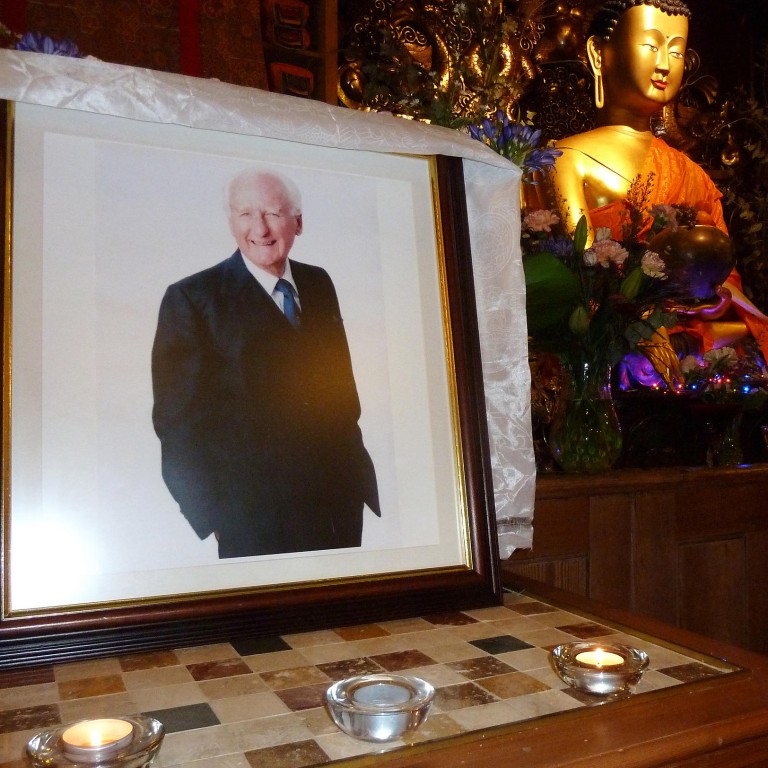
Robert Ford, independent Tibet's first radio operator, dies at 90
Robert Webster Ford, the first Westerner employed as a civil servant by the then-independent Tibetan government and who helped set up the country's radio network, was remembered in a prayer service in London on Friday. The only European captured by Chinese forces during the 1950 invasion of Tibet, Ford died in the British capital on September 20 aged 90 after a short illness.
Robert Ford
1923-2013
Robert Webster Ford, the first Westerner employed as a civil servant by the then-independent Tibetan government and who helped set up the country's radio network, was remembered in a prayer service in London on Friday. The only European captured by Chinese forces during the 1950 invasion of Tibet, Ford died in the British capital on September 20 aged 90 after a short illness.
The Dalai Lama led tributes at the ceremony, held at the Jamyang Buddhist Centre.
"I am saddened to learn of the passing of my friend, Robert Ford. He occupies a special place in the history of Tibet," the Dalai Lama said.
"Since my coming into exile in 1959, your father and I have been in regular contact and I have enjoyed meeting him on several occasions," he wrote in the letter addressed to Ford's family.
"My father would have been very touched by the traditional prayers. He often said the happiest days of his life were in Tibet despite what happened to him," said Ford's son, Giles who attended the prayer service.
Born on 27 March 1923, in Staffordshire, Britain, Ford served in the Royal Air Force as a radio technician during the second world war in England and India. In 1945 he joined the British Mission in Lhasa as a radio officer and in 1947 joined the Tibet government and was stationed in Chamdo.
As the British newspapers reported at the time, Ford was the first foreigner to be given an official rank in the country and was dubbed "the Loneliest Briton in the World" because of his remote posting.
But he was captured by the PLA in 1950 and, along with his Tibetan bosses, thrown into jail and solitary confinement.
"I came to work on the day of the invasion and was told by the fleeing staff my bosses had fled. I grabbed my pony, and caught up with my superiors two days later, but we were then all captured," Ford told earlier this year.
During his captivity he underwent "struggle sessions" - a form of public humiliation - until he was expelled in 1955. He was escorted to the Hong Kong border, where he was handed over to the territory's then colonial government.
He wrote a book about his experience, and became a supporter of Tibetans up until his death.
He was a founder member of the Tibet Society in 1959 and remained a vice-president for the rest of his life.
After returning to Britain he joined the Foreign Office and served as a diplomat in various overseas posts. He retired in 1983 as UK consul general in Geneva, Switzerland. He was knighted in 1982 and awarded a CBE.
In April, he was awarded the Light of Truth Award in Switzerland by the Dalai Lama, who first met Ford in Lhasa at the age of 11.
The self-proclaimed Tibetan government-in-exile's UK office presented Ford with the last of his salary, a 100 srang note of Tibetan currency, on his 90th birthday.
He had been imprisoned by the Chinese authorities before his salary was due.
He told the : "I had jokingly reminded the Tibetans recently that I had not been paid and they'd better hurry up."
He recalled: "The Tibet that I found … in 1945 was vastly different to the Tibet of today. It was an independent country with its own government, its own language, culture, customs and way of life. It was a very special, sometimes difficult, time in my life."
In 1992, his lecture tour of India was cut short after he and wife were detained in Dharamsala by the Indian authorities because their visit coincided with an official visit by then Chinese premier Li Peng .
The Tibet UK office's Thubten Samdup said: "Robert Ford is revered by Tibetans because he stood by us all his life. News of his death has fittingly been announced over the radio in Tibet. We are all saddened."
Robert Ford is survived by his two sons, Martin and Giles, and three grandchildren, Emma, Candice and Nicholas.

